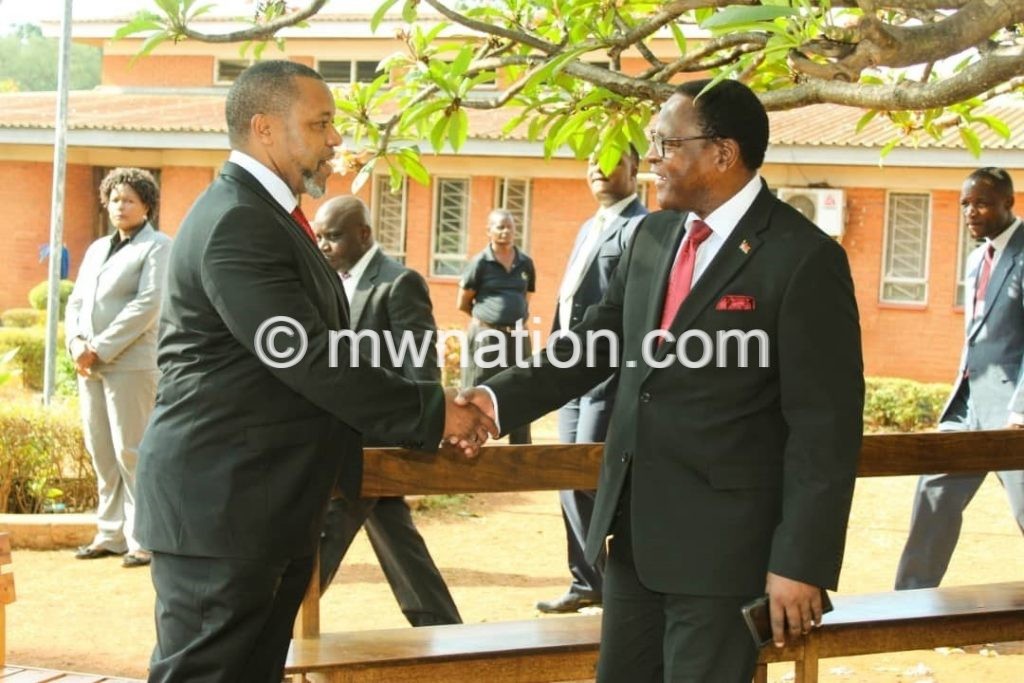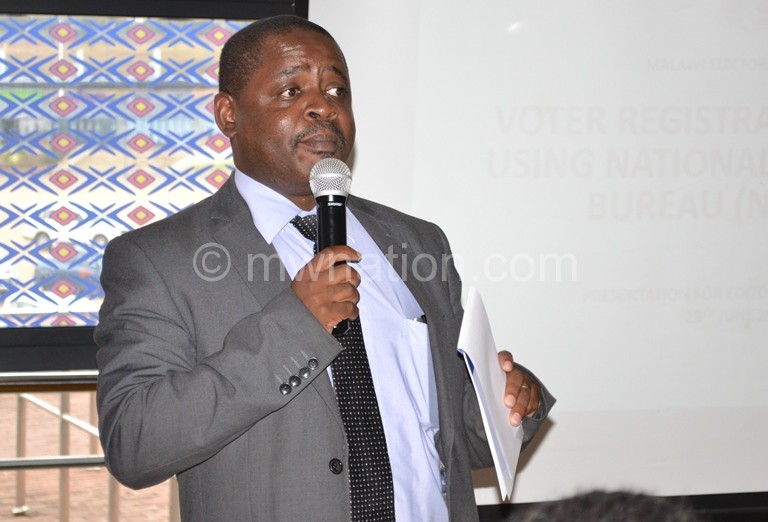Elections case rolls into final leg
The Constitutional Court (ConCourt) on Friday made a giant leap towards what is poised to be a historic ruling—with both parties in the case signalling confidence that their witnesses have done enough to sway the court.
Lawyers for first petitioner Saulos Chilima and second petitioner Lazarus Chakwera, opted against cross- examining Malawi Electoral Commission (MEC) director of ICT Muhabi Chisi.

Chilima was UTM’s candidate in the May 21 presidential election, while Chakwera contested on an MCP ticket. The two want the court to nullify MEC’s declaration of DPP’s Peter Mutharika as winner on grounds that the polls were fraudulent.
Lawyers for President Mutharika, whom MEC declared winner of the elections with 38 percent of the vote, trailed by Chakwera and Chilima in turn decided against cross-examining Chisi.

As a result, Chisi, who was supposed to be the last witness to testify in the landmark presidential election case, walked out of the witness box without answering any question or even taking oath.
That marked the end of 59 days of testimony from some 18 witnesses, including the two presidential hopefuls, who, once again, were in court as they have done religiously. The development allowed the court to move forward, announcing the timeline for final submissions of the case and an early morning adjournment.
Addressing the court on behalf of the panel of five judges, Healey Potani announced they had agreed that final submission of arguments will be held on December 19 and 20 2019. But he did not specify the expected date for the ruling on the case.
Potani, who thanked all parties to the case for their cooperation, assured them and the public that the court would make its judgement based on constitutional merits and evidence tendered in court.
“We will make a decision solely based on the evidence before the court, evidence that is properly recorded before the court, and also on the basis of the applicable law. We shall not take into account any other consideration, not even public opinion. This is in line with what the Constitution provides for,” he said.
Potani then outlined the timeline for submission of final arguments on the case, saying all the four parties to the case and Friends of Court, Malawi Law Society (MLS) and Women Lawyers Association (WLA), will have to submit both hard and soft copies to the court.
Those submissions, he told the hearing, must clearly state the party’s case in line with specific constitutional questions, which must be determined by the court.
Potani told the court that by 4.30pm on December 10 2019, both petitioners must file to court and serve all parties, including friends of the court, written submissions. Thereafter, by December 13 2019, the respondents must serve the courts and all parties to the case written responses.
By December 16 2019, the petitioners must file to the court and serve on all parties a reply if need be.
On December 18 2019, Friends of the Court, MLS and WLA must file to the court and serve on all parties their submissions.
And, on December 19 and 20, the court will reconvene to hear all arguments. The first and second petitioners will have three hours and the first and second respondents will also be given three hours for the task. Friends of the Court will have an hour each to make their submissions.
Once outside, each side of the case claimed in interviews it had done enough to persuade the court to rule in its favour.
Lawyer for Mutharika, Frank Mbeta, said the hearing has demonstrated that Mutharika won the elections legitimately.
“I am sure there is enough ground for the court to dismiss the petitions because where the Tippex was used, we were able to show using our evidence, even using their own evidence and evidence from the Electoral Commission that it was used to correct genuine mistakes.
“The duplicates were used because they had messed up the originals and they wanted to capture corrections. What they are calling fake tally sheets were reserve tally sheets,” said Mbeta.
He said the opposition candidates had failed to provide any evidence to back their claims and reiterated that the final tally of votes reflected the will of the people.
“All in all, we will be submitting that there is no ground for the court to overturn the will of the people in selecting Professor Peter Mutharika,” added Mbeta.
Attorney General Kalekeni Kaphale, who is representing MEC in his position as chief legal adviser to government, focused on commending the Judiciary for managing the historic case prudently.
“It’s the court which will interpret evidence. Let me commend the Judiciary for properly managing the litigation and the Malawi public for keeping calm. The trial went well until the last witness walked out of the door,” he said.
Both lawyers Modecai Msisha, who is representing Chakwera and Chikosa Silungwe, who is representing Chilima, expressed confidence that the case for nullification of the results had been made clear and was overwhelming.
Msisha, a veteran lawyer who was among the framers of the Constitution, said evidence has indicated that “probably 1.4 million votes were affected by those irregularities” and such evidence will now be consolidated and written in a manner that would be easy for the court to follow.
He said there were many questions around the validity of elections that no reasonable person would regard the poll results as a legitimate expression of the will of the people.
“We are not saying deliver the victory to so, so, we are simply saying you cannot determine who won,” said Msisha.
Silungwe said the court’s procedure was not very clear in the early days of the hearing, but he was delighted that the court, with the cooperation of lawyers for both sides, did its best so that the matter is concluded as quickly as possible.
“Speaking for the first petitioner [Chilima], we were always going to question the constitutional statutory duty of the Electoral Commission as manager of elections. Our point has always been that when you look at the body and how it discharged the elections, the commission failed in that duty. To that extent, therefore, we remain fortified that we have achieved that objective,” said Silungwe.





